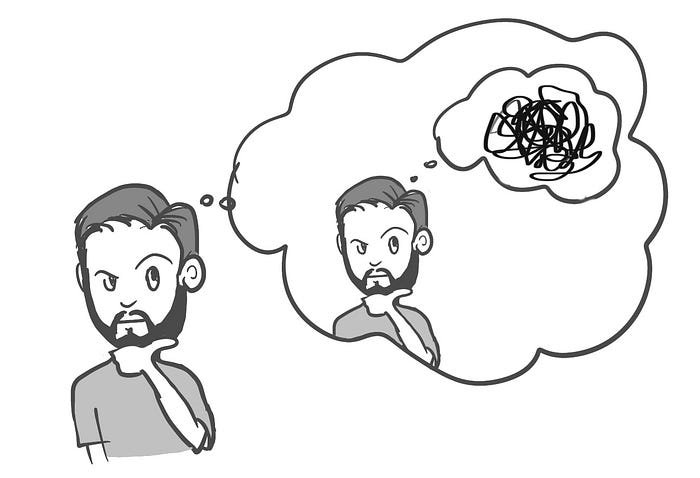

The Power of Thinking about Thinking: How to Unlock Your Full Creative Potential
source link: https://uxplanet.org/a-secret-to-becoming-a-seasoned-designer-think-about-your-thoughts-3a100bf19356
Go to the source link to view the article. You can view the picture content, updated content and better typesetting reading experience. If the link is broken, please click the button below to view the snapshot at that time.
The Power of Thinking about Thinking: How to Unlock Your Full Creative Potential
No it’s not interaction, prototyping or visual skills, neither is effective communication. It’s rather meta…

It’s Metacognition. Or thinking about one’s own thinking. In other words, how to actively control the process of thinking during learning situations.
Metacognition is an important skill for designers to develop in order to continually improve and optimize their design process. In the design field, it is essential to be able to reflect on and analyze one’s own design choices and decisions. This involves considering not just the end result of a design, but also the thought process and reasoning behind it. Meta cognition allows designers to identify any biases or assumptions that may have influenced their work, and to evaluate the effectiveness of their design solutions.
How does Meta cognition help a designer:
Improved problem-solving
Research is a first order thinking where designer/researcher gather insights about user problems. Second order thinking is equally important to actively reflect on and analyze one’s own thought process while making these observations, identifying patterns and areas for improvement. This can help them enhance their problem solving capabilities and become more efficient and effective at finding solutions to the complex design challenges.
Better creative ideas
Meta cognition can also help designers to be more creative by encouraging them to question their assumptions and biases, and to consider a wider range of possible solutions. This will help them see the bigger picture and connect the seemingly unconnected dots which eventually leads to novel creative ideas.
Enhanced communication and collaboration skills
Reflecting on one’s own thought process can also help designers better articulate their ideas and design decisions to others. Instead of just empathizing with others during conflict, it is equally important to empathize with yourself so that you can rationally evaluate your biases before empathizing with others.
Improved self-awareness
Meta cognition can also help designers to become more self-aware and to recognize their own strengths and areas for improvement. This can enable them to focus on their unique skills and capabilities and to continually grow and develop as designers.
How to practice meta cognition as a designer:
1. Regularly review and reflect on your own choices and decisions.
One way to do that is going for a walk everyday for at least 15-20mins to reflect on and analyze your emotions and actions of the day or the week. This reflection on your thinking process and your biases can be done in any ongoing design activity such as while evaluating user research. How was your mood when you made those observations? Tired, hangry, frustrated, happy? Or when you are designing a solution, did you add that tab bar just because the previous app you designed had a similar design or did you actually thought that through?
2. Practice mindfulness
Mindfulness involves being present in the moment and fully engaged in your work. By practicing mindfulness, you can become more aware of your own thought processes and make more intentional design choices. One way to implement this is to be aware of your thoughts and emotions when you are in conflict with your teammate. Notice what responses are triggered within you. Don’t try to step away from the conflict, just observe yourself in the situation. You will learn more about yourself through this activity than anything else.
3. Seek feedback and analyze your reaction
It is important to get feedback from others and consider different perspectives on your work. Additionally, whether you receive positive or constructive feedback, analyze your own response and emotions. This will allow you to separate the person giving the feedback from the content of the feedback, allowing you to objectively evaluate and act upon it.
4. Set goals and objectives for your projects
By setting clear goals and objectives for a project, you can regularly check in on your progress and make adjustments as needed. Even if you don’t enjoy managing tasks and goals, it’s important that you are aware of what you are doing and why you are doing it. Without clear goal setting, there will be nothing to reflect on and improve.
5. Seek out new learning opportunities
Speak with your data science colleague and learn about their process for identifying where users are leaving your product. Keep up-to-date on industry trends and best practices, and seek out diverse perspectives and viewpoints to broaden your knowledge and understanding. It doesn’t matter if those trends are directly related to your work. Learning about new things can open your mind and help to reduce biases.
6. Collaborate with others
This is a no-brainer. Working with others can provide valuable opportunities for learning and growth. Some designers tend to create solutions on their own and only present them for critique or review at a later stage. This can lead to more changes to the designs and unhealthy feedback, causing resentment. Involving others from the start brings more opinions to the table and helps set the right direction.
Overall, meta cognition is a crucial skill for designers to cultivate in order to continually improve and refine their design process. By regularly reflecting on and analyzing their own work and seeking out new learning opportunities, designers can optimize their design solutions and create more impactful and effective designs. Please leave a comment below if you think there are other benefits or ways to practice Meta cognition.
Recommend
About Joyk
Aggregate valuable and interesting links.
Joyk means Joy of geeK